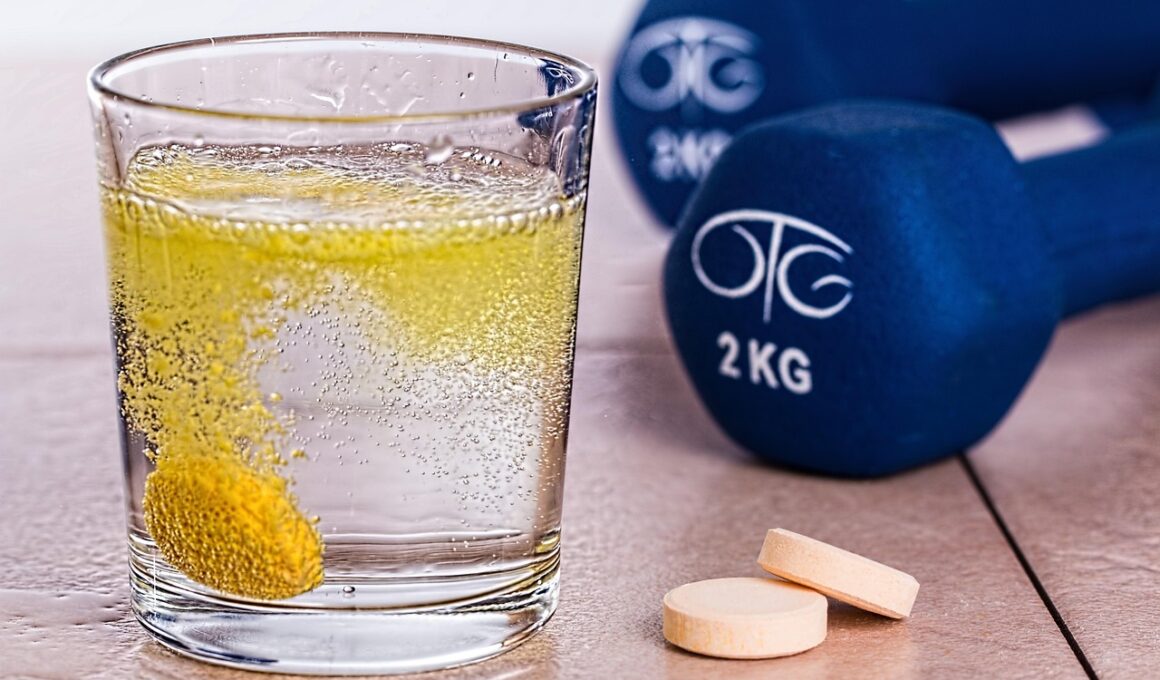The Role of Sports Organizations in Regulating Supplement Use
Sports organizations play an integral role in ensuring the safety and efficacy of supplements used by athletes. As the demand for dietary and nutritional supplements rises within competitive sports, these organizations implement regulations to protect athletes from potentially harmful substances. It’s crucial that athletes understand their responsibilities regarding supplement use and the implications it has on their health and performance. By providing clear guidelines and educational resources, sports organizations help maintain a level playing field within competitions. They also collaborate with scientists and nutrition experts to review the efficacy and safety of various supplements. In addition to setting standards, these organizations monitor supplement usage closely, employing testing protocols to detect banned substances. Athletes must be aware that not all supplements are created equal; the regulatory landscape can vary significantly from one region to another. Reporting any adverse effects or suspicious products is encouraged among athletes, promoting transparency and accountability within sports. Additionally, these organizations must adapt to constantly evolving scientific research and supplement market trends to remain vigilant against new threats. Maintaining athlete health should be the foremost priority, which requires ongoing education and engagement with all stakeholders involved.
In establishing guidelines for supplement usage, sports organizations must consider various factors such as legal regulations, scientific evidence, and ethical considerations. These organizations are tasked with educating athletes about the importance of choosing safe, effective supplements that comply with regulations. Athletes sometimes face pressure to perform at increasingly higher levels, leading to the temptation of using performance-enhancing supplements. Awareness campaigns about the risks associated with unregulated or banned supplements are essential, emphasizing that ignorance is no excuse for violations. Thus, these campaigns play a vital role in athlete education and promote a culture of health, integrity, and transparency in sports. Organizations often partner with nutrition specialists to refine these guidelines, ensuring they reflect the latest research. Regular updates and communication are necessary to keep athletes informed and protect their health interests. Furthermore, the emphasis on ethical sportsmanship means supplement use should enhance performance based on a solid foundation of health rather than artificially inflating capabilities. By maintaining these ethical standards, sports organizations aim to preserve the spirit of fair competition while safeguarding athlete well-being. Ethical considerations are just as significant as identifying harmful substances or those that provide an unfair advantage.
Collaboration with Regulatory Bodies
Collaboration between sports organizations and governmental bodies is crucial for effective regulation of supplements. These relationships help create a unified approach to safety and compliance, providing athletes with clear guidance as they navigate the complex world of supplements. Various regulatory agencies, such as the Food and Drug Administration (FDA) in the United States, have established guidelines for dietary supplements that sports organizations can reference. Working together, these entities can enhance understanding surrounding various substances found in the market. Regulatory bodies often conduct comprehensive reviews of supplement ingredients, leading to valuable insights into safety and efficacy considerations. Athletes must recognize the existence of both legal and ethical standards when choosing supplements. With the collaboration of these bodies, sports organizations can continually evaluate and refine regulatory practices to adapt to emerging trends in the supplement industry. Transparency within this collaboration ensures that athletes can make informed choices, minimizing risks associated with supplement consumption. Furthermore, this partnership also promotes research into alternative performance-enhancing methods that are both safe and effective. Through collective efforts, sports organizations and regulatory agencies can create a health-focused environment where athletes prioritize their well-being.
Sports organizations also play a critical role in monitoring supplement-related trends and issues impacting athletes. The landscape of sports nutrition is ever-changing, with new products and ingredients entering the market continually. Consequently, sports organizations must stay informed about evolving research on supplement safety and efficacy. This vigilance is necessary to protect athletes from potentially harmful or substandard products. Registration and verification programs have been developed to aid in this monitoring process. For example, organizations like NSF International provide third-party certification for dietary supplements, ensuring they meet safety and quality standards. When leveraging these programs, athletes can make more informed choices about which supplements to trust. Education remains a central component of this monitoring process; educating athletes about the importance of verifying supplement quality is essential. Moreover, sports organizations need to promote the significance of reporting adverse events associated with supplements. Such reporting can lead to improved guidelines and product regulations in the long run. By facilitating open communication channels, organizations reveal potential safety breaches and empower athletes to actively contribute to the integrity of their sport through responsible supplement usage.
Education and Advocacy
Education and advocacy are paramount in the ongoing efforts of sports organizations to regulate supplement use effectively. They strive to provide comprehensive training resources that enhance athletes’ understanding of supplements, including their benefits and potential risks. Workshops, seminars, and informational materials are valuable tools for educating athletes about safe supplement consumption and the importance of adhering to established regulations. Sports organizations are committed to advocating for a transparent supplement industry, pushing for stricter regulations and quality control measures to protect athletes. Advocacy efforts include lobbying for policy changes and funding research dedicated to identifying harmful substances. By actively engaging in these discussions, sports organizations aim to cultivate a healthier competitive environment for athletes. Collaboration with leading nutritionists, researchers, and regulatory bodies fosters a strong network working together towards common goals. Regularly updating educational resources, adapting to scientific advancements, and addressing emerging trends in the industry are essential steps in this process. Through these focused efforts, sports organizations empower athletes to make informed decisions when it comes to supplement use, playing a significant role in their overall health and performance. This drive for positive change encompasses not only safety but also ethical considerations in sports.
Transparency regarding supplement ingredients and labeling significantly influences athletes’ trust in sports organizations. By advocating for clearer product labeling, organizations contribute to creating an informed athlete population. Consumers can make educated choices based on ingredients, dosages, and possible side effects, ultimately fostering safer supplement use. Such transparency builds a foundation of trust, encouraging athletes to rely on organizational recommendations for supplement selections. Furthermore, these organizations work diligently to combat fraudulent products that misrepresent their contents. By coordinating efforts with regulatory bodies, effective strategies can be implemented to identify and remove harmful products from the market. Educating athletes about navigating potential frauds in the supplement industry enhances their ability to make safer choices. Attention to this issue cultivates responsible consumption habits that protect athletes’ health and careers. Moreover, promoting awareness of legal actions against companies selling misleading or harmful supplements serves as a deterrent for unethical practices. As the responsibility for safety is shared between organizations, athletes, and consumers, collaboration becomes vital. The collective effort towards transparency empowers athletes and instills confidence in their chosen supplement choices while prioritizing wellbeing as a fundamental aspect of competitive sports.
Future Directions
The future of supplement regulation in sports hinges on collaboration, research, and innovation. As science evolves, new supplements with unprecedented ingredients will enter the market, demanding proactive responses from sports organizations. Continuous evaluation of these products by scientific experts will become essential in ensuring athlete safety. Furthermore, organizations need to stay updated with technological advancements that can facilitate more effective testing and monitoring processes. By integrating advancements, they can promote product transparency while protecting athletes from harmful substances. The growing emphasis on holistic health and alternative training methods may shift supplement use trends, requiring adaptation in regulations and educational materials. As athletes increasingly seek out natural supplements and options that align with health-focused philosophies, organizations must adjust guidelines accordingly. Being adaptable can provide athletes with informed choices tailored to their evolving preferences. The intersection of technology, health awareness, and compliance will likely redefine how we regulate supplements in sports. Collaboration among sports organizations, government agencies, and industry stakeholders will foster innovation while ensuring ethical practices prevail. Ultimately, the goal remains clear: to safeguard athlete health while empowering them to reach their full potential through responsible supplement use.
In conclusion, the role of sports organizations in regulating supplement use is multifaceted and essential for athlete safety and success. By establishing guidelines, collaborating with regulatory bodies, and promoting education and advocacy, these organizations create a systematic approach to supplement management in sports. Athletes must understand that the responsibility for safe supplement use extends beyond regulations; it requires personal commitment to health and integrity. Continuous education empowers athletes to make informed decisions while navigating the complexities of the supplement landscape. The shared responsibility between sports organizations, athletes, and consumers fosters a culture of accountability focusing on safe practices. Transparency will characterize future supplement regulations, enabling athletes to make choices aligned with their health goals and ethical beliefs. As the world of sports nutrition continues to evolve, the collaboration between stakeholders becomes increasingly vital. Through innovative approaches, continuous research, and dedicated advocacy efforts, the collective mission remains to prioritize athlete health and well-being. Striving for excellence, clarity, and safety in supplement use cultivates a balanced sporting environment, emphasizing the core values of fairness, integrity, and respect that define sportsmanship.


